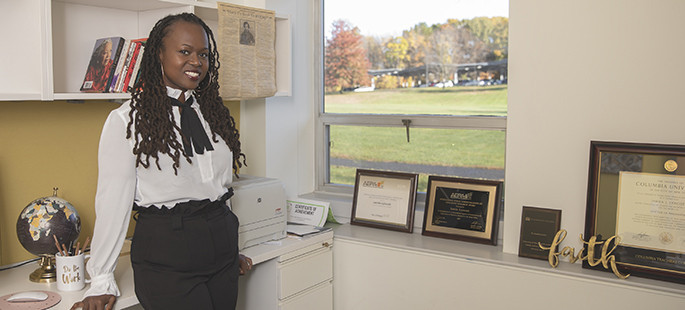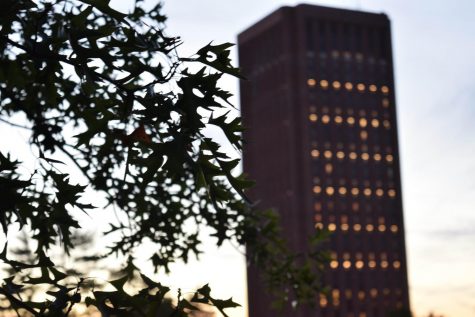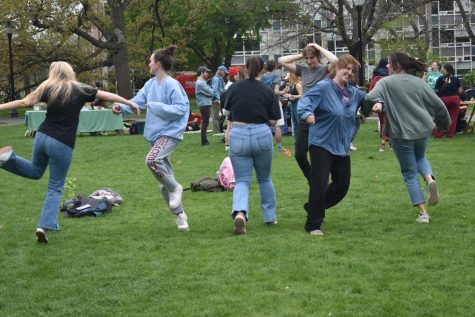The spotlight is on Jamila Lyiscott
With great passion and humility, Jamila Lyiscott has been advocating for students of color in the classroom to benefit them outside of it.
Jamila Lyiscott poses for Spotlight Scholar article
AMHERST – UMass Amherst’s Spotlight Scholar, Jamila Lyiscott, deserves more than just a spotlight.
Working as an assistant professor of social justice education for the College of Education, Lyiscott instills a life-long message of exceeding the restrictions institutions impose on her students and the UMass community. With humility and passion for her work, Lyiscott serves as a great role model for all of her students.
“My mission is to support individuals and institutions to become their highest selves. I want to work alongside them,” said Lyiscott.
Lyiscott grew up as a first-generation American in Brooklyn, N.Y. She found comfort in going to church and being a part of youth organizations. When she was 15, she became involved with Urban Word NYC, an organization that supports young writers, where she traveled locally to perform poetry.
It was within these community-based organizations where Lyiscott realized there were different ways of engaging young voices and minds outside the constraints of a conventional classroom.
“I noticed a lot of my peers were extremely talented and were thriving but hated school,” said Lyiscott. “School was just a backdrop of hoops that I had to jump through until college. It was in college that I cared more about learning and was pushed to think more critically.”
Since she was young, Lyiscott felt the presence of racial disparities in the world.
“I realized after growing up that my parents were very intentional about me staying woke. We were always in conversation about who I am in this world,” said Lyiscott.
She says everything her parents did for and around her as a child were “seed[s] planted” for the work she would later pursue.
At the age of 19, Lyiscott appeared on an academic panel to speak to high school students about their transition to college. In the middle of her sentence, she was interrupted by a woman, who called her articulate. This moment would be a turning point in her life.
“I know she meant it as a compliment,” said Lyiscott. “But it’s about holding individuals to the responsibility of that kind of thinking and perspective and holding institutions to the responsibility that me speaking standardized English leaves an impression and is the only way to sound intelligent.”
After this experience, Lyiscott felt uncomfortable and confused. As she rode the train home, she decided to put her feelings into a poem.
“Poetry always helped me question my world in a way school didn’t,” said Lyiscott.
When she was 26, TED reached out to her and asked if she could perform her poem, “3 Ways to Speak English.” With delight, she complied and a month later, her talk was presented on the front page of TED.
“I started getting messages from all over the world. The talk was translated into 20+ languages and was being thrown around all over the media.”
In addition to appearing on TED, she was interviewed by several news outlets. She even went on to write her own book, “Black Appetite, White Food.” Writing this book was initially challenging for her, as she struggled at first to force herself to fit the mold of what a book “should” sound like.
“I ended up throwing out my entire book outline and wrote the book how I wanted to write it. I felt more connected to my voice after this.”
Lyiscott has always implemented her voice into every piece of her work, despite the institutional pressure she feels her and many others face. In doing so, she combats racial injustice by encouraging youth to be self-expressive by using their own unique voices freely.
When asked about her greatest accomplishments, Lyiscott did not name any awards she had won, any media platforms she had appeared on or even mention the book she had written.
She said, “The relationships I build with young people in my spiritual community, as a Christian and using those values to help people be their highest selves. There’s something to be said about how I represent the fact that they can be more than predominantly white institutions limit them to be. These people erase themselves in some way and I feel like, for a lot of people, they now feel like they can be unapologetically viewed.”
Lyiscott never pursued media outlets, as they were never her priority. To her, these were simply just “nice surprises.”
“The most important thing is that my message is heard, felt and spread,” said Lyiscott.
As an assistant professor at UMass, Lyiscott is still making sure her message is instilled. She finds comfort in the support of her colleagues and the resources around her, both of which contribute to her vision.
She is currently working to launch a center for racial justice and youth engaged research. Her goal is to uphold different racial practices by bringing in historically marginalized communities.
“I hope to sustain racial justice and youth leadership across discipline and education. I see the work of racial equity and youth and leadership voice are essential practices of every discipline, not just the arts,” said Lyiscott.
Lyiscott recently won a grant through the Fulbright Student Program, giving her and 12 other teachers the opportunity to travel to Ghana in July for 30 days. She is going to work with other teachers to uphold these values and ideas, while also questioning, “how they can honor complex linguistic ideas of students as something valuable and that are connected to the youth voice.”
Although she pursues her work at UMass right now, she feels she was meant to do what she is doing right now, as it is “a calling that is beyond anything,” she said. “Even if it wasn’t here, I would be doing it somewhere else.”
Email Carrie at [email protected].











